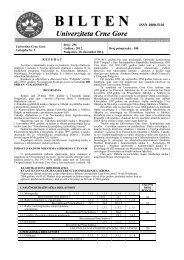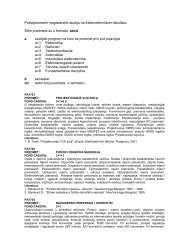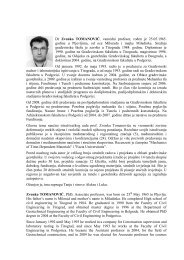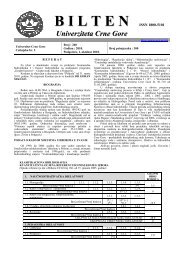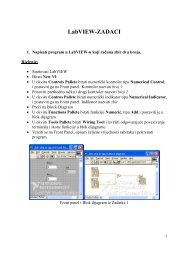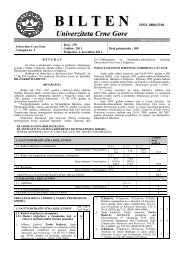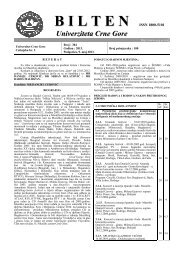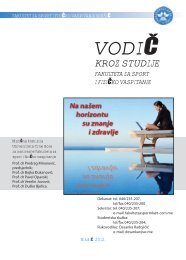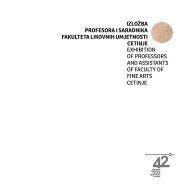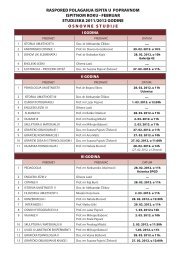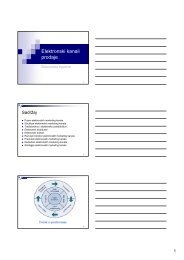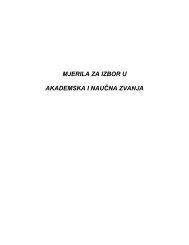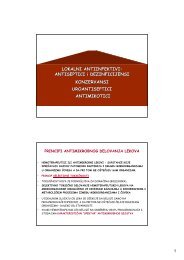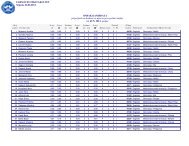WHO monographs on selected medicinal plants - travolekar.ru
WHO monographs on selected medicinal plants - travolekar.ru
WHO monographs on selected medicinal plants - travolekar.ru
You also want an ePaper? Increase the reach of your titles
YUMPU automatically turns print PDFs into web optimized ePapers that Google loves.
Oleum Ricini<br />
examined by scanning electr<strong>on</strong> microscopy. The changes that appeared<br />
after treatment with ricinoleate were partially reversed during perfusi<strong>on</strong><br />
with c<strong>on</strong>trol buffer for 2 hours (30).<br />
Clinical pharmacology<br />
Laxative effect<br />
Castor oil is an ani<strong>on</strong>ic surfactant laxative. Its mechanism of acti<strong>on</strong> is primarily<br />
as a stool-wetting and stool-softening agent that allows the mixing<br />
of water, lipids and other faecal material by altering intestinal permeability<br />
and increasing net water and electrolyte secreti<strong>on</strong>s. The triglyceride of<br />
ricinoleic acid in castor oil is hydrolysed within the small intestine by<br />
pancreatic lipases to ricinoleic acid and glycerol. Ricinoleate acts as a local<br />
irritant that increases producti<strong>on</strong> of cyclic adenosine m<strong>on</strong>ophosphate resulting<br />
in extensive electrolyte secreti<strong>on</strong> in the small intestine by reducing<br />
net absorpti<strong>on</strong> of fluid and electrolytes, which ultimately stimulates intestinal<br />
peristalsis. Because ricinoleate acts in the small intestine, accumulati<strong>on</strong><br />
of fluid and evacuati<strong>on</strong> takes place rapidly within 1–6 hours, and it<br />
c<strong>on</strong>tinues until the compound is excreted via the col<strong>on</strong>. Col<strong>on</strong>ic emptying<br />
is so complete that several days may elapse before a normal bowel<br />
movement occurs (21).<br />
To examine the effects of oleic acid and ricinoleic acid <strong>on</strong> jejunal absorpti<strong>on</strong>,<br />
steady-state jejunal perfusi<strong>on</strong>s were d<strong>on</strong>e in healthy volunteers.<br />
Taurocholate, used to solubilize the fatty acids, did not influence absorpti<strong>on</strong>.<br />
Both fatty acids, at a c<strong>on</strong>centrati<strong>on</strong> of 10 mM, reversed electrolyte<br />
and water net movement and induced reversible fluid secreti<strong>on</strong>. Ricinoleic<br />
acid (the active principle of castor oil) was the more potent compound.<br />
However, ricinoleic acid was absorbed more slowly than oleic acid, and<br />
was associated with higher intraluminal c<strong>on</strong>centrati<strong>on</strong>s (31).<br />
A retrospective study was performed in patients who underwent elective<br />
surgery for colorectal carcinomas. The patients were divided into<br />
two groups according to the method of col<strong>on</strong>ic cleansing that was used.<br />
Group 1 (n = 154) used the traditi<strong>on</strong>al bowel preparati<strong>on</strong> which included<br />
30.0 ml castor oil given orally <strong>on</strong> the day before the operati<strong>on</strong>, in additi<strong>on</strong><br />
to three soap enemas. Patients in group 2 (n = 36) were given 500 ml<br />
10% mannitol <strong>on</strong> the day before the operati<strong>on</strong>. Infecti<strong>on</strong>s due to wounds<br />
developed in 26 patients from group 1 versus 13 patients from group 2.<br />
The difference was statistically significant (16.9% versus 36.1%, p < 0.01).<br />
The differences in the incidence of anastomotic leaks and mortality rate<br />
between the two groups were not statistically significant. Castor-oil<br />
treatment reduced the number of postoperative infectious wound complicati<strong>on</strong>s<br />
(32).<br />
277



